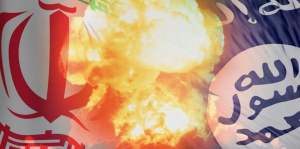What every presidential candidate & policy-maker needs to know about Apocalyptic Islam. (Two fact sheets)
Today, we remember the horrific attacks by al-Qaeda on New York, Washington and Pennsylvania and all the effort that has been made to defeat — or at least contain — the forces of Radical Islam.
But fourteen years after 9/11, the nature of the threats we face in and from the Middle East have significantly changed. The forces of Radical Islam still pose a serious danger, to be sure. But an even more serious threat is emerging from a movement I call “Apocalyptic Islam,” led by Iran and ISIS.
While I have raised such issues in a range of novels over the years — from The Twelfth Imam to The Third Target (and its forthcoming sequel, The First Hostage) — it is vital at this moment for the public and our leaders to understand the facts. Indeed, much of the confusion in Washington over just how dangerous the Iran nuclear deal is stems from a deep misunderstanding of what is truly motivating the leaders in Tehran.
Thus, in this column published today by National Review, I explain what Apocalyptic Islam is, how the Shia and Sunni versions are similar and how they differ, who believes it, and why it matters. I also ask, “Do U.S. policymakers and the presidential candidates understand the nature of this threat? If they do, they should explain how they would counter it before it’s too late.”
Joel Rosenberg's Blog ~ Read More
Joel Rosenberg's Blog ~ Read More
——————————
Radical Islam? Apocalyptic Islam Poses The Greater Threat
By Joel C. Rosenberg
September 11, 2015
To misunderstand the nature and threat of evil is to risk being blindsided by it.
Fourteen years ago — on September 11, 2001 — America was blindsided by the forces of radical Islam. Pre-9/11, American leaders rightly understood that the vast majority of the world’s Muslims were generally peace-loving people who posed no threat to our homeland. But they failed to adequately comprehend, much less counter, the theology, political ideology, and operational strategy of men like Osama bin Laden.
The results were devastating. The attacks against the World Trade Center, against the Pentagon, and over Shanksville, Pa., killed nearly 3,000 Americans, along with individuals from 93 other nations, in the most devastating sneak attack since we were blindsided by the Imperial Japanese at Pearl Harbor on December 7, 1941.
Today, President Obama and members of his administration still refuse to use the term “radical Islam,” even as Jordan’s King Abdullah II, a direct descendant of the Prophet Muhammad, candidly admits that the West is engaged in a “third world war” against Islamic terrorism. Abdullah adds that, at its core, “this is a Muslim problem. We need to take ownership of this. We need to stand up and say what is right and what is wrong.”
The king is right. The threat of radical Islam to the U.S. and our allies is serious and ongoing.
That said, there is a dramatic shift underway in the Muslim world. The most serious threat we face in the Middle East and North Africa is no longer radical Islam but apocalyptic Islam….


No comments:
Post a Comment